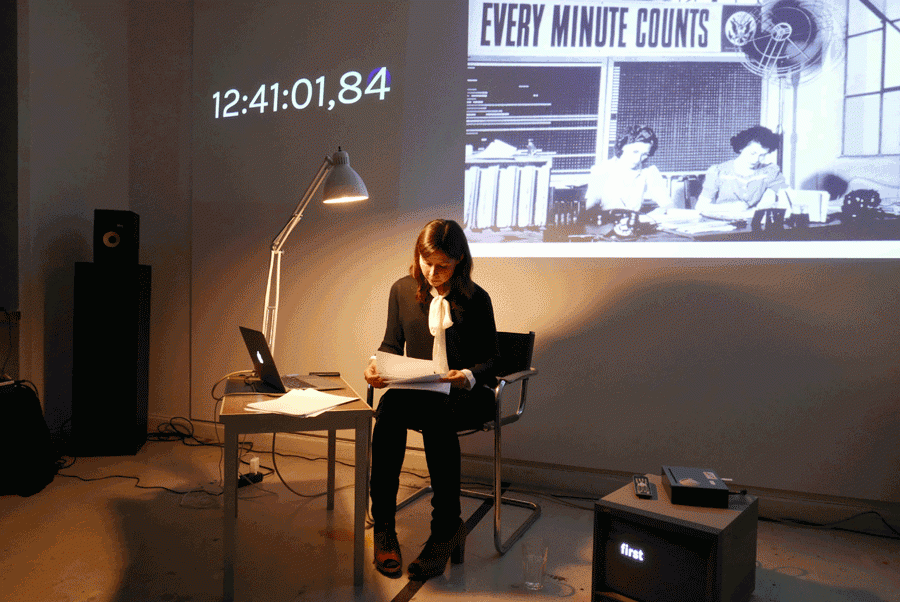Before calling what he did ‘curating’, Harald Szeemann, who was in many ways responsible for shaping the current definition of the discipline, used to describe his exhibitions as ‘staged’. He brought dramaturgy and performativity into the genre, elements upon which Catalonian artist-curator Alexandra Laudo’s recent exhibition-performance An intellectual history of the clock (2016) is also founded: however, here we don’t see any artworks; we only hear about them. The etymological roots of the word ‘clock’ lie in the Latin clocca (bell): originally the passing of time was something to listen to.
Laudo stages her work through the self-initiated, Barcelona-based curatorial platform Heroínas de la Cultura, and in An intellectual history of the clock, a wonderfully narrated combination of historical research, artworks, a diary and a lunch, she contextualises the notion of time, its measurements and synchronisation, and its relation to capitalism and the future. All within the space of 60 minutes. As we entered a semidetached house in Stockholm (belonging to the Nordic Art Association), we encountered a kitchen table covered with ingredients, each labelled with their respective cooking times: red peppers – ‘grill 16 minutes’; meat – ‘bake 1 hour’; parsley – ‘deep-fry 20 seconds’. As a chef began to perform the prescribed actions, we were invited into a small auditorium, welcomed by the pips of the Greenwich Time Signal.
Laudo offers us the opportunity to think about exhibitions not in terms of square metres, but in units of minutes, hours or days
“Good afternoon. It is 12 o’clock here in Stockholm and in the rest of Sweden. It is also 12 o’clock in Barcelona and in the rest of Spain, except on the Canary Islands, where it is one hour less.” Laudo’s narrative continued, taking us through various conceptualisations of time, from its standardisation as a result of the Industrial Revolution to the story of a journey on the Orient Express from Paris to Constantinople across several time zones. Our host went on to introduce us to a work by Mexican artist Julieta Aranda, about Kiribati, a Pacific archipelago that, until 1995, was divided by the International Date Line, before addressing laziness and unproductivity by describing Mladen Stilinovic’s Artist at Work (1978) and considering the concept of punctuality via Tehching Hsieh’s One Year Performance (1980–81), in which the artist punched a time clock every hour for a year. As Laudo moved into relations of time, money and labour, we were asked to read an extract from Jonathan Crary’s 24/7: Late Capitalism and the Ends of Sleep (2013), in which the author examines the relations of ubiquitous consumerism and a related will to abolish human sleep. The artist-curator’s narration closed with As slow as possible (1987), by John Cage (scheduled to last until 2640, it is currently being performed at Halberstadt Cathedral in Saxony-Anhalt, Germany, with tickets being sold until 2091).
An hour later, lunch was ready for us at the exit. Having experienced this performative exhibition at speed, I was left thinking about the fact that, while it may have been brief, it had been quality time. Laudo had offered us the opportunity to think about exhibitions not in terms of square metres, but in units of minutes, hours or days. Lecture-performances are not a new genre, having had a momentum since the early 2000s. Many artists, such as choreographers Xavier Le Roy or Jérôme Bel, inspired by poststructuralism, turned from producing movement to speaking about movement; Slavs and Tatars eloquently create their own discourse, as if to preempt potential writers on their work; while Hito Steyerl shares parts of her ongoing research and makes art through her own presence. But with Laudo’s work one encounters an entire narrated exhibition as a performance, without artworks, only their narrated trace, which ultimately becomes an artistic endeavour in itself – it is simply too much for ‘curating’ as we know it. Laudo is currently developing a series of new narrated exhibitions, sequels that focus on the act of sleeping, on velocity and on the ritual of birthdays. I can’t wait.
Alexandra Laudo is based in Barcelona. She is the founder and director of the curatorial platform Heroínas de la Cultura.
From the January & February 2017 issue of ArtReview, in association with K11 Art Foundation
